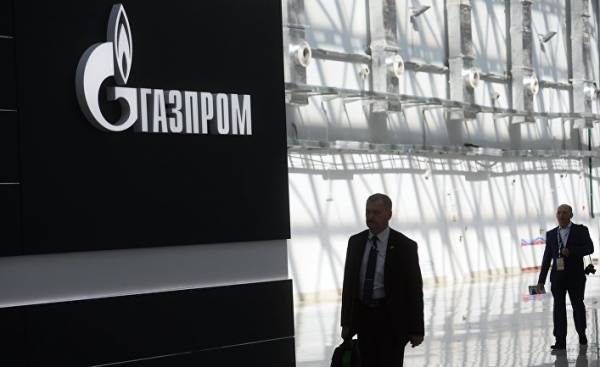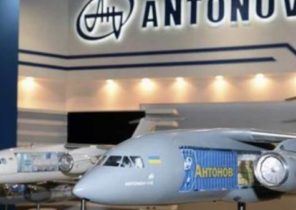
On 13 March the EU Commissioner for competition, Margrethe Vestager (Margrethe Vestager) announced that the European Commission is ready for a peaceful settlement which lasts for the fifth year antitrust case against Gazprom, which was accused of abusing its position on the markets of Central and South-Eastern Europe. Although the market implications of this decision are yet to be analyzed, such a scenario seems quite likely. In the course of antitrust investigations it found evidence of abuse and the fact that the players of the Central European gas market have suffered losses. However, the Russian company will eventually be able to avoid formal charges in violation of competition rules and a fine.
Obligations that is ready to take on Gazprom, will make it possible to unify the used concern in Central and South-Eastern Europe, practices with those which it uses in the Western part of the continent. In the first place this will entail a waiver of those provisions of contracts which restrict the free movement of gas and allows to change prices depending on the buyer. In addition, Gazprom is obliged to take steps that will improve the situation in the most isolated markets of the region (Bulgaria and the Baltic States).
The willingness of Gazprom to change its methods connected greatly with what is happening in the EU market and legislative changes, as well as steps aimed at diversifying sources of supply and integration. Obligations of Gazprom thus fit into the European strategy of the group, which began to change some time ago. Probably some concessions by Gazprom would have gone anyway regardless of the outcome of the antitrust proceedings. In the end, an amicable conclusion of the case mostly put an end to previous practices, which in recent years has already been revised, but will not prevent new problems associated with a more aggressive market game for Gazprom in the EU or with the dominance of the group in the markets of Central and South-Eastern Europe (for example, associated with the project “Northern stream-2”).
Antitrust investigation
At the end of the spring 2015 antitrust investigations the European Commission has accused the Russian company of abusing a leading position and the use of monopolistic practices in the countries of Central and South-Eastern Europe. Following the procedure, Gazprom has responded in writing to these claims in September 2015 and drew up the preliminary list of so-called obligations, which he is willing to take in connection with the allegations.
14 February 2017 after nearly eighteen months of negotiations Gazprom has submitted the final list of commitments. The European Commission has at this stage accepted them, finding that they correspond to extended claims and will help to improve the competitiveness and liquidity of the gas market in Central and South-Eastern Europe, which dealt with the investigation. Now the European Commission commenced the market valuation of obligations of Gazprom. This means that it will examine what possible market consequences may bring their implementation. In the next seven weeks (until 4 may) the European Commission will wait for feedback from interested players, primarily from Central European market participants and governments of individual countries. While the States of Central and South-Eastern Europe react not too active. A critical evaluation of the obligations of Gazprom gave the Polish oil and gas company PGNiG.
After reviewing the opinions of market participants, the Commission will decide whether to reject the proposal of the Russian company and decide on violation of the Antimonopoly law (prohibition decision), followed by the promulgation of evidentiary materials of the case and a fine. This version of events seems in light of recent events, not very likely, and likely, the European Commission will make a positive decision. Then offers Gazprom will acquire legal force, and the concern will have to give up some practices that discriminated against recipients in Central and South-Eastern Europe.
Obligations Of Gazprom
The official list claims that in April 2015, sent to Gazprom by the European Commission has included allegations of abuse of a dominant position on the market in eight countries-EU members: Bulgaria, Czech Republic, Estonia, Lithuania, Latvia, Poland, Slovakia and Hungary. The group violated competition law by using the strategy of dividing the exports, in particular, by prohibiting the re-export of raw material price increases (in Poland and the Baltic States) and aligning the supply with the obligations relating to transport infrastructure (Poland and Bulgaria). In an effort to end an antitrust investigation compromise, Gazprom has pledged to take steps aimed at normalizing the situation in all these areas the European Commission.
First of all, the concern will abandon the use in existing and future contracts for the supply of gas to customers in Central and South-Eastern Europe from most of the provisions that restrict the free movement of gas and allow prices to vary. In particular, from direct and indirect territorial restrictions (which make it impossible or complicate the re-export or resale of gas). Also, Gazprom will be obliged to simplify the procedure of revision of prices in relation to the so-called benchmark (associated with the prices of Western European gas hubs and the edge points).
Such innovations are to some extent repeat those changes that are around the mid 2000-ies have been made in the contracts with Western European customers. This is especially important for those countries in which the revision of the principles of supply happened too slowly or not at all produced in the first place for Bulgaria and the Baltic States. In several other countries in the region, including in the Visegrad countries, according to available information, the process of adaptation of prices to market standards and the gradual exclusion of contracts of territorial restrictions has already begun. In some way it was associated with the antitrust proceedings, and in some- with the integration of regional markets and lower oil prices, which has decreased linked to them in the contracts of Gazprom gas prices.
At the same time the Russian company undertakes to amend transit Treaty with Bulgaria. She will have the opportunity to integrate with neighbouring countries (including Greece), the local regulator will be able largely to control the transportation of gas within the country, and Gazprom will refuse the financial claims to the capital associated with its abandonment of the construction of the gas pipeline “South stream” on Bulgarian territory. Finally, the concern will allow Bulgaria and the Baltic States to change the points of delivery specified in the contracts, and opens thus the way to so-called swap operations (Poland will be able to make the virtual supply in the Baltic States, Slovakia and Hungary to Bulgaria).
The value of commitments for the region
A comprehensive assessment of the values proposed by the Gazprom obligations to give difficult, in particular due to the fact that they affect separate provisions of the contracts that are the subject of a trade secret. For different countries, these consequences will be undoubtedly different. The biggest winners will be Bulgaria and the Baltic States (especially Lithuania). Other States (including the Visegrad countries, which are in a less isolated position) will have the opportunity to strengthen the market base of its relations with the Russian company.
The obligation of Gazprom will allow, in particular, to a greater extent (though perhaps not fully) to relate prices in the region with the prices of Western European gas markets — primarily the German. At the same time it is difficult to say with certainty how changes in the policy of Gazprom associated with the antitrust investigation of the European Commission, as well as — changes in the markets and were being made in the region of steps aimed at diversifying sources of supply, which forced the group to adjust its European strategy.
In the case of the Visegrad four countries the obligation of Gazprom not only lead to modification of some of the strategies concern, how much speed up at least part of the processes that would have appeared in any case in connection with changes in the market (increase the role of hubs and access to players from Central Europe) and European legislation (e.g. the ban on territorial restrictions in contracts).
Gazprom liabilities relate primarily to those methods to which it has contacted in the past and in recent years have changed. Meanwhile, they are only slightly oriented towards the future and preventing new risks associated with the dominant position of Gazprom in some countries. It can be seen, in particular, on the example of the debt associated with the gas infrastructure of the region: they relate to an unrealised project “South stream”, but does not touch on the subject of new pipelines that may have a big impact on the security of gas supply (project “North stream-2” and its land continued EUGAL, the project “Turkish stream” and his land continue in the EU).
The situation in which Gazprom undertakes at an accelerated pace to abandon in many cases, inevitable revision of its methods, and at the same time away from punishment for monopolistic practices, is contradictory. It can cause resentment among part of the Central European companies and States that have suffered in the past from these practices tangible losses.
The value for Gazprom and Russia
Gazprom initially sought a peace agreement in the antitrust case: this is evidenced by the fact that he sent the European Commission a list of their obligations. If the decision is positive, the concern violation of competition rules will not receive a formal evaluation. In the end Gazprom will be able to avoid the penalty, and the Commission will not publish the evidence material collected at all stages of the investigation. Thus, the list of obligations is, on the one hand, a sign of willingness to make concessions and to give legal guarantee that some of the practices that were used in Central and South-Eastern Europe, will also change. On the other hand, how painful will be these limits for Gazprom, it is hard to say, since the content of the contract remains secret. On the basis of publicly available information about the changes made concern the contracts with buyers from Western Europe, we can say that the stated commitment will be for the Russian side is not too burdensome.
First, Gazprom will not have to take any action for the restructuring or sale of assets. All commitments relate only to the content of contracts with customers in Central and South-Eastern Europe on deliveries and gas transit.
Second, the overwhelming part of the obligation of Gazprom in respect of buyers from these regions (the unification of the provisions on revision of prices, the rejection of provisions that restrict the free circulation of gas throughout the EU market) in previous years has already become a reality in the contracts with customers from Western Europe. Implement changes in contracts with Central European customers is part of the new strategy of Gazprom in relation to the EU, in which the group is increasingly adheres to the norms of European law, sells gas at auctions, implementing new infrastructure projects and activates the game by maintaining or even increasing its market share.
Third, some commitments look concessions only at first glance. An example would be here the intention to include in its gas agreements a provision allowing customers to change the destination of Russian gas. In practice, this kind of operation will take place on profitable for Gazprom, the conditions: the volume of deliveries should reach at least 100 million cubic meters per year and per shift of the item, the buyer will have to pay extra. In addition, the company will not be liable for possible problems that would arise when changing the point of receipt of gas, and will reserve the right to refuse compliance with the requirements of the buyer in the absence of required transit capacity or volume of raw materials.
Process and gas relations between Russia and the EU
The probability of an amicable completion of the antitrust proceedings against Gazprom indicates that both Russia and the European Commission are interested in the normalization of bilateral gas relations.
For Gazprom and Russia, the European Union in the future at least the next decade will remain a strategic market. Given the changing conditions on the EU market and Russia, we can expect that Gazprom will continue to modify its strategy in relation to European customers, focusing on the European realities (for example, reviewing the provisions of contracts, increasing the volume of sales of raw materials at auction). It can be assumed that many of the items of commitments agreed to take on Gazprom, would be implemented in any case (with the difference, that is probably slower and different for different countries). It is also clear that in the near future the Russian company will even more strongly promote the EU projects on construction of new pipelines: the “Nord stream-2” and “Turkish stream.” Gazprom expects that due to the normalization of bilateral relations with the EU (which will be possible also thanks to the constructive position of the concern in antitrust proceedings), the European Commission will not block these initiatives as it will eventually have the tools to achieve their goals in the European gas market (increasing the share of presence, profit maximization).
The desire of the European Commission to end an antitrust investigation compromise despite strong opposition arising in connection with this decision, shows that Brussels, with the support of the largest EU States (including Germany) wanted to establish gas relations with Russia. Proof of this are favorable for Gazprom’s decision, which the Commission adopted at the end of last year (improving access to OPAL pipeline), as well as an increasingly favourable attitude to the EU project “Northern stream-2”.
The fact that Gazprom will be able to escape punishment for their monopolistic practices in Central and Southeast Europe, may, however, undermine the confidence of the countries of these regions to the European Commission. Due to the existing EU differences of opinion about the proceedings and the Russian gas projects can be expected to increase intra-European contradictions. Parties to the conflict are here, Central Europe (especially Poland) and Germany, and their dispute concerns the optimal format of cooperation with Gazprom and contacts with Russia in the context of the ongoing conflict in Ukraine and the role of Russian gas in the European gas market.







